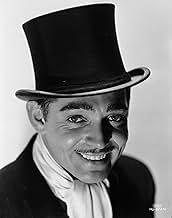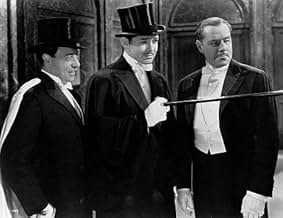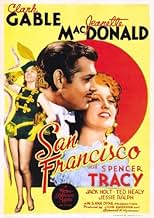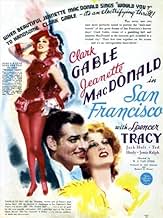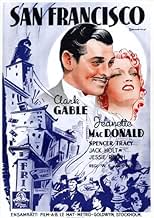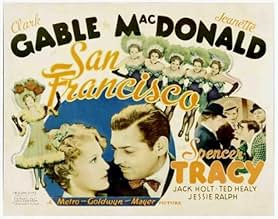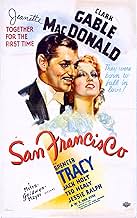San Francisco
- 1936
- Tous publics
- 1h 55m
IMDb RATING
7.1/10
6.4K
YOUR RATING
A Barbary Coast saloonkeeper and a Nob Hill impresario are rivals for the affections of a beautiful singer, both personally and professionally, in 1906 San Francisco.A Barbary Coast saloonkeeper and a Nob Hill impresario are rivals for the affections of a beautiful singer, both personally and professionally, in 1906 San Francisco.A Barbary Coast saloonkeeper and a Nob Hill impresario are rivals for the affections of a beautiful singer, both personally and professionally, in 1906 San Francisco.
- Director
- Writers
- Stars
- Won 1 Oscar
- 5 wins & 6 nominations total
Charles Judels
- Tony
- (as Charles Judells)
Warren Hymer
- Hazeltine
- (as Warren B. Hymer)
- Director
- Writers
- All cast & crew
- Production, box office & more at IMDbPro
Featured reviews
MGM's blockbuster was conceived originally as a vehicle for Jeanette MacDonald to co-star with some non-singing players while her normal screen partner Nelson Eddy was on a concert tour. Mr. Eddy always considered his screen roles secondary to his concert singing which was the reverse of how Jeanette felt.
According to a recent book about both Eddy and MacDonald, Clark Gable had been gotten out of romantic dalliance with some hush money MGM paid some woman off with. He didn't really want to do the film, but Louis B. Mayer kind of hammerlocked him into it. MacDonald however chose Spencer Tracy for the part of Father Tim Mullin, Gable's best friend and conscience of the movie.
Nevertheless the part of Blackie Norton, impresario of the Barbary Coast in 1906 San Francisco fits Gable perfectly. The man takes his pleasures where he finds them, but has a concern for the folks in his area who are getting the raw end of things from the upper crust on Nob Hill as personified by Gable's rival Jack Holt.
Gable and Holt are rivals for Jeanette MacDonald as well. She's fresh from the country, a parson's daughter with a great set of soprano pipes. Both like what they see, but Holt appreciates her voice quite a bit more than Gable at first.
Besides Ms. MacDonald, Gable and Holt have their differences over some of the rottenly constructed houses on the Barbary Coast and Gable wants a lot of new construction there. Of course the Earthquake of April 18, 1906 settles the whole issue of urban renewal.
If the special effects Oscar was around at that time, San Francisco would have won it for sure. Even over 60 years after the film came out and with the more modern techniques of special effects available, the sight of the earthquake is still visually stunning.
Gable and MacDonald did not get along on the set, Gable was more used to down to earth leading ladies like Crawford and Harlow. MacDonald and Tracy got along just fine. Her intercession with Louis B. Mayer changed the course of Tracy's career forever. Previous to San Francisco, Tracy played a whole slew of roughneck heroes in B films at Fox and his first few at MGM were in the same mold. As Father Tim Mullin, Tracy became the wise father figure (no pun intended) that the public came to know so well. He received his first Academy Award nomination for this part.
Jeanette has some operatic selections and three hymns to sing during the film, The Holy City, Battle Hymn of the Republic, and Nearer My God to Thee. She also got two original songs, Would You and the title tune of the film.
The song San Francisco was adopted by the city fathers of San Francisco as the city's official song. That is until Tony Bennett lost his heart there. Controversy still rages on the bay as to which should be the official song of San Francisco.
San Francisco made a whole lot of money for Leo the Lion that year. It in fact inspired Darryl F. Zanuck to burn down Chicago the following year so he could get in on that disaster epic box office.
San Francisco still holds up well today, the action, the music, and Spencer Tracy's groundbreaking performance. Something for everyone.
According to a recent book about both Eddy and MacDonald, Clark Gable had been gotten out of romantic dalliance with some hush money MGM paid some woman off with. He didn't really want to do the film, but Louis B. Mayer kind of hammerlocked him into it. MacDonald however chose Spencer Tracy for the part of Father Tim Mullin, Gable's best friend and conscience of the movie.
Nevertheless the part of Blackie Norton, impresario of the Barbary Coast in 1906 San Francisco fits Gable perfectly. The man takes his pleasures where he finds them, but has a concern for the folks in his area who are getting the raw end of things from the upper crust on Nob Hill as personified by Gable's rival Jack Holt.
Gable and Holt are rivals for Jeanette MacDonald as well. She's fresh from the country, a parson's daughter with a great set of soprano pipes. Both like what they see, but Holt appreciates her voice quite a bit more than Gable at first.
Besides Ms. MacDonald, Gable and Holt have their differences over some of the rottenly constructed houses on the Barbary Coast and Gable wants a lot of new construction there. Of course the Earthquake of April 18, 1906 settles the whole issue of urban renewal.
If the special effects Oscar was around at that time, San Francisco would have won it for sure. Even over 60 years after the film came out and with the more modern techniques of special effects available, the sight of the earthquake is still visually stunning.
Gable and MacDonald did not get along on the set, Gable was more used to down to earth leading ladies like Crawford and Harlow. MacDonald and Tracy got along just fine. Her intercession with Louis B. Mayer changed the course of Tracy's career forever. Previous to San Francisco, Tracy played a whole slew of roughneck heroes in B films at Fox and his first few at MGM were in the same mold. As Father Tim Mullin, Tracy became the wise father figure (no pun intended) that the public came to know so well. He received his first Academy Award nomination for this part.
Jeanette has some operatic selections and three hymns to sing during the film, The Holy City, Battle Hymn of the Republic, and Nearer My God to Thee. She also got two original songs, Would You and the title tune of the film.
The song San Francisco was adopted by the city fathers of San Francisco as the city's official song. That is until Tony Bennett lost his heart there. Controversy still rages on the bay as to which should be the official song of San Francisco.
San Francisco made a whole lot of money for Leo the Lion that year. It in fact inspired Darryl F. Zanuck to burn down Chicago the following year so he could get in on that disaster epic box office.
San Francisco still holds up well today, the action, the music, and Spencer Tracy's groundbreaking performance. Something for everyone.
On 31 December 1905, a fire destroys a building at Barbary Coast in San Francisco and on the next day, the singer Mary Blake (Jeanette MacDonald) from Benson, Colorado, that lived in the burnt building looks for a job at the nightclub Paradise. The owner Blackie Norton (Clark Gable) is a ruthless but good man and hires Mary after asking her to show her legs. Blackie is also invited to run to the position of Supervisor of the Coast by his friends and acquaintances to protect the neighborhood.
When Blackie's competitor from Nob Hill, Jack Burley (Jack Holt), and his friend Maestro Baldini (William Ricciardi), hear Mary singing, Jack invites her to sing at his fancy Tivoli Opera House. However, Mary has a two-year contract signed with Blackie and is in love with him. But when the other artists from Paradise see her with Blackie and make malicious comments about her, she quits and goes to Tivoli. On her debut at the Tivoli, Blackie goes there with an authority to call off the concert. Blackie has an injunction against Jack Burley since Mary is still under contract with him. However, when he hears Mary singing the opera, he changes his mind and proposes her to get married with him.
Mary returns to the Paradise but when Blackie's friend Father Tim Mullin (Spencer Tracy) sees Mary exposing her legs, he does not allow her to go to the stage. Mary works at Tivoli and is proposed by Jack Burley to marry him. Meanwhile the powerful Jack Burley uses his influence with the Powers that Be to close the Paradise and arrest the performers. During a musical competition between the clubs, Mary Blake learns the truth and decides to help the Paradise with her presentation. However, it is 1906, the year of the major earthquake that struck San Francisco.
"San Francisco" is a wonderful film of love and earthquake in the sin city. I had no idea that this film was so good and this is the first time that I watch "San Francisco". The story is excellent, with charismatic and ambiguous characters, enjoyable songs sang by Jeanette MacDonald and stunning special effects, with a realistic and convincing earthquake. The very last scene is fantastic.
Clark Gable and Jeanette MacDonald show a magnificent chemistry and it is impressive the resemblance of the face of Madonna in the 80's with Jeanette MacDonald. I only regret that I had not seen this film before. My vote is eight.
Title (Brazil): "San Francisco – A Cidade do Pecado" ("San Francisco" – The Sin City")
When Blackie's competitor from Nob Hill, Jack Burley (Jack Holt), and his friend Maestro Baldini (William Ricciardi), hear Mary singing, Jack invites her to sing at his fancy Tivoli Opera House. However, Mary has a two-year contract signed with Blackie and is in love with him. But when the other artists from Paradise see her with Blackie and make malicious comments about her, she quits and goes to Tivoli. On her debut at the Tivoli, Blackie goes there with an authority to call off the concert. Blackie has an injunction against Jack Burley since Mary is still under contract with him. However, when he hears Mary singing the opera, he changes his mind and proposes her to get married with him.
Mary returns to the Paradise but when Blackie's friend Father Tim Mullin (Spencer Tracy) sees Mary exposing her legs, he does not allow her to go to the stage. Mary works at Tivoli and is proposed by Jack Burley to marry him. Meanwhile the powerful Jack Burley uses his influence with the Powers that Be to close the Paradise and arrest the performers. During a musical competition between the clubs, Mary Blake learns the truth and decides to help the Paradise with her presentation. However, it is 1906, the year of the major earthquake that struck San Francisco.
"San Francisco" is a wonderful film of love and earthquake in the sin city. I had no idea that this film was so good and this is the first time that I watch "San Francisco". The story is excellent, with charismatic and ambiguous characters, enjoyable songs sang by Jeanette MacDonald and stunning special effects, with a realistic and convincing earthquake. The very last scene is fantastic.
Clark Gable and Jeanette MacDonald show a magnificent chemistry and it is impressive the resemblance of the face of Madonna in the 80's with Jeanette MacDonald. I only regret that I had not seen this film before. My vote is eight.
Title (Brazil): "San Francisco – A Cidade do Pecado" ("San Francisco" – The Sin City")
I have just watched the colorized version of this knock-out film. Whether in color or B &W, it is a powerfully entertaining film. When Blackie Norton finds religion and Mary Blake spots him, humbled and on his redemption encrusted knees,tears well up in my jaded eyes. Everything works so wonderfully in this film. Still, as destructive and tragic as the earthquake scenes are,this movie is basically a love story and what male would not swoon over the voice and the innocence of Mary Blake. Certainly not me.
This is a great old film. I have seen it several times, and enjoy it every time. I think Jeanette MacDonald is beautiful, and what a voice! I love to hear her sing.
My mother gave me my middle name of Jeanette after her. It is interesting that a film with so much "fancy" singing
could have been so popular. The general public must have had more class then than now.
It is good to see the "oldies." Many of them are better than today's films.
I certainly like this one.
My mother gave me my middle name of Jeanette after her. It is interesting that a film with so much "fancy" singing
could have been so popular. The general public must have had more class then than now.
It is good to see the "oldies." Many of them are better than today's films.
I certainly like this one.
As in the '70s, disaster films were all the rage in the '30s, with "Hurricane," "The Rains Came," "In Old Chicago," and, of course, 1936's "San Francisco" which certainly sent the other studios running to destroy anything they could. The film stars Clark Gable, Jeannette MacDonald, and Spencer Tracy as three citizens of that beautiful city on April 18, 1906, when the big earthquake struck.
Gable plays Blackie Norton, a quintessential role for him - a tough, charming rogue who runs The Paradise Club. MacDonald is the lovely and talented Mary Black who arrives there looking for work, and Spencer Tracy is Father Tim, who is Blackie's conscience (so he ignores him) and Mary's moral compass. Mary is torn between two loves - her love for Blackie and her love for opera. Burley (Jack Holt) wants her contract from Blackie so he can star her at the Tivoli Opera, but in all things, she suppresses her own desires so that she can stay with Blackie. She finally does leave but returns...only to leave again after an ugly confrontation between Blackie and Father Tim. Things get a lot uglier at an annual contest - and that's when the chandelier starts moving back and forth.
It's amazing what the films in the pre-computer age were able to do with special effects because the earthquake in "San Francisco" is dazzling, spectacular, and downright scary. Given the horrors of 9/11 and Katrina, one is drawn into the devastation and suffering as people search for loved ones, watch their houses fall, go crazy, and see their beloved city dynamited because there's no water to stop the raging fires. 70 years later, it's all way too close to home.
As good as he always was with Gable, Spencer Tracy did not have much of a role as the good father, but he's excellent. MacDonald poses a problem. Normally, she plays a diva or spitfire, and she did those roles beautifully. But Mary Blake is a modest and religious woman who speaks softly and sublimates her own desires for the man she loves. It doesn't ring true, and it doesn't work opposite the volatile Blackie of Gable's. If Mary had been more like other roles she played, MacDonald probably would have had good chemistry with him. As it is, they don't make much of a couple. Her singing is pretty until she hits the opera stage - with the combination of the tinny sound system in those days and the way women were trained on high notes then, the end result isn't good. She sings "The Jewel Song," which she often did in concert, the finale of "Faust," and "Sempre Libera." MacDonald was a lyric coloratura and suited to the demands of the opera stage in the '30s, but today she sounds dated as standards have changed.
This is a great film to see to appreciate the artistry of the early technicians. The effects in "San Francisco" hold up against anything that came 40 years later. The ending is pure Hollywood hokum, but very stirring. It gave this viewer goosebumps. Don't miss Hollywood at its very best.
Gable plays Blackie Norton, a quintessential role for him - a tough, charming rogue who runs The Paradise Club. MacDonald is the lovely and talented Mary Black who arrives there looking for work, and Spencer Tracy is Father Tim, who is Blackie's conscience (so he ignores him) and Mary's moral compass. Mary is torn between two loves - her love for Blackie and her love for opera. Burley (Jack Holt) wants her contract from Blackie so he can star her at the Tivoli Opera, but in all things, she suppresses her own desires so that she can stay with Blackie. She finally does leave but returns...only to leave again after an ugly confrontation between Blackie and Father Tim. Things get a lot uglier at an annual contest - and that's when the chandelier starts moving back and forth.
It's amazing what the films in the pre-computer age were able to do with special effects because the earthquake in "San Francisco" is dazzling, spectacular, and downright scary. Given the horrors of 9/11 and Katrina, one is drawn into the devastation and suffering as people search for loved ones, watch their houses fall, go crazy, and see their beloved city dynamited because there's no water to stop the raging fires. 70 years later, it's all way too close to home.
As good as he always was with Gable, Spencer Tracy did not have much of a role as the good father, but he's excellent. MacDonald poses a problem. Normally, she plays a diva or spitfire, and she did those roles beautifully. But Mary Blake is a modest and religious woman who speaks softly and sublimates her own desires for the man she loves. It doesn't ring true, and it doesn't work opposite the volatile Blackie of Gable's. If Mary had been more like other roles she played, MacDonald probably would have had good chemistry with him. As it is, they don't make much of a couple. Her singing is pretty until she hits the opera stage - with the combination of the tinny sound system in those days and the way women were trained on high notes then, the end result isn't good. She sings "The Jewel Song," which she often did in concert, the finale of "Faust," and "Sempre Libera." MacDonald was a lyric coloratura and suited to the demands of the opera stage in the '30s, but today she sounds dated as standards have changed.
This is a great film to see to appreciate the artistry of the early technicians. The effects in "San Francisco" hold up against anything that came 40 years later. The ending is pure Hollywood hokum, but very stirring. It gave this viewer goosebumps. Don't miss Hollywood at its very best.
Did you know
- TriviaClark Gable did not want to make this film but he was at the mercy of MGM studio head Louis B. Mayer, who had just paid off one of his numerous paramours.
- GoofsAs Blackie walks away from a building being blown up (actually a process shot), Clark Gable's head becomes momentarily transparent.
- Quotes
Jack Burley: [referring to Mary Blake] Well, there's no law against an opera singer being slender, young and beautiful.
- Crazy creditsPrologue: "San Francisco--guardian of the Golden Gate--stands today a Queen among seaports--industrious, mature, respectable. But perhaps she dreams of the Queen and city she was--splendid and sensuous, vulgar, and magnificent--that perished suddenly with a cry still heard in the hearts of those who knew her, at exactly 5:15 a.m. April 18, 1906."
- Alternate versionsAfter initial premiere, the manager of the Paramount Theater in San Francisco added to the downbeat ending a few shots showing the Golden Gate Bridge being built. Seeing the positive public reaction, MGM decided to have the sequence added to all other prints in release.
- ConnectionsEdited into What Price Safety! (1938)
- SoundtracksSan Francisco
(1936)
Music by Bronislau Kaper and Walter Jurmann
Lyrics by Gus Kahn
Played during the opening credits and often in the score
Sung by Jeanette MacDonald (uncredited)
Reprised by her and others at a political rally and at the end
- How long is San Francisco?Powered by Alexa
Details
- Release date
- Country of origin
- Language
- Also known as
- Grad greha
- Filming locations
- San Francisco, California, USA(background footage)
- Production company
- See more company credits at IMDbPro
Box office
- Budget
- $1,300,000 (estimated)
- Runtime1 hour 55 minutes
- Color
- Aspect ratio
- 1.37 : 1
Contribute to this page
Suggest an edit or add missing content



